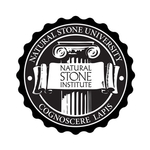Granite, Radon, Radiation and Other Myths
AP Story "Countertops get creative" Corrections
May 2014 — On Wednesday, May 28, 2014, AP writer Diana Marszalek authored an article on trends in kitchen countertops titled "Countertops get creative." The article contained two misleading statements at the close of the article:
- "Even granite countertops have drawbacks. Some granite releases trace amounts of radon, the radioactive gas."
Natural Stone Institute Comment: There are many sources of radiation in a typical home. Common items such as concrete blocks, televisions, smoke detectors — and even Brazil nuts, bananas and potatoes release measureable levels of radiation. The fact is, radiation and radon levels from other sources in the home are far more significant than what may be measured from a granite countertops. Consumer and industry safety are paramount issues for the stone industry, and numerous studies have been conducted to verify the safety of granite in the home. - "Izzo instead is a fan of quartz. Although it's about as expensive as granite, it doesn’t have the radon issue and it's less porous, therefore less likely to harbor bacteria, he says."
Natural Stone Institute Comment: O. Peter Snyder, Jr., Ph.D. and the Hospitality Industry of Technology and Materials have studied numerous countertop materials. In short, the ability or inability to harbor bacteria, per Dr. Snyder's studies, is the same for both products. For the facts, click here.
The article was reissued by the AP on Thursday, May 29th without those two statements. Then on Friday, May 30th the AP again issued the "Countertops get creative" story with a revised closing: "Izzo notes that granite countertops can release trace amounts of the radioactive gas radon. The Marble Institute of America notes that many other items in and around a home also can emit radon. The U.S. Environmental Protection Agency says most granite countertops are safe, adding little to a house's radon level. It depends on the rock that is used, the agency says, recommending that homeowners concerned about radon get their countertops tested."
Natural Stone Institute Comment: Unfortunately there are now three versions of the article circulating within online and print news outlets. Again, numerous studies posted on this page have been conducted to verify the safety of granite in the home.
Radon Exposure No Concern to Quarry Workers
April 2014 — In order to extract the beautiful granite rock that adorns so many countertops, floors and building facades in the United States, skilled quarry workers must saw or blast the raw granite into blocks to remove it from the quarry location for further fabrication. Given that soil and rock slowly and naturally emit radon gas, some sought out to study whether these men and women who work so close to the earth face any elevated risk of radon exposure.

The study, conducted by Environmental Health & Engineering of Cambridge, MA, proves that workers in granite quarries do not face risk of elevated expose to radon. In fact, air monitoring conducted as part of this study found that the radon concentrations measured at varying heights in a deep quarry in Vermont, selected to represent a 'worst-case' scenario because of the depth and high natural background radon, were all less than 0.3 picocuries per liter (pCi/L). This observed value is less than the average background radon concentration in the United States. To see a copy of the study, click here.
Radiation Exposure a Non-Issue for Granite Fabrication Workers
March 2014 — If you own or work in a facility that produces granite countertops, would you show up every day if there was a fear radiation exposure from the granite used to produce the tops? Of course not.

The fact that tens of thousands of owners and craftsmen make a living fabricating and installing granite and other stone countertops should tell you all you need to know about the health hazards of working with granite eight or more hours a day.
The fact that tens of thousands of owners and craftsmen make a living fabricating and installing granite and other stone countertops should tell you all you need to know about the health hazards of working with granite eight or more hours a day.
There is none.
That fact was confirmed in a recent study of radiation in the stone workplace completed recently for the Marble Institute of America. To see a copy of it, click here.
Granite One of Most Studied Building Materials

February 2014 — Ever since man began building things, the use of natural stone has been a constant.
One of the most popular types of stone, granite, has been used in everything from tombs to places of worship, government and institutional buildings, modern skyscrapers, homes and other types of construction.
Throughout it’s history, granite has proved itself a beautiful, versatile and durable building material. Nowhere is there any reasonable documentation that it harmful to human health, a claim originally initiated by makers of competing countertop products.
But to allay public fears resulting from bogus claims, the stone industry conducted research that proves conclusively that the amount of radon found occasionally in a slab of granite is not harmful to humans exposed to it. This research mirrors independent studies which produced the same results.
The fact is that granite has been studied thoroughly and the results are clear; the granite most commonly used in U.S. homes is safe.
A list of scientific studies on granite is on the right side of this page.
The Doctors Show Admits It Erred In Granite/Radon Segment
November 2013 — Thanks to quick and forceful action by the Marble Institute of America and its legal team, The Doctor’s Show has retracted a show segment in which it reported that living in a home with granite countertops could be as bad as smoking a half package of cigarettes a day.
Seven days after the report, The Doctors Show admitted it had erred in the report, which had attributed the radon/granite information to the EPA.
“On October 24, we featured a segment discussing granite countertops and the potential for these countertops to emit radon gas,” the retraction said. ”In that segment, we inadvertently attributed the following statement to the EPA.
“The EPA (Environmental Protection Agency) says some types of granite countertops could be as bad as smoking a half pack of cigarettes a day. The EPA did not make this statement regarding the health risks of granite countertops.”
The retraction came after the Natural Stone Institute and its legal team presented a number of scientific studies that show granite countertops are safe in the home and work place.
“The Doctors Show is the latest example of inaccurate information reported as fact by companies seeking to benefit financially from either the sale of radon/radiation testing equipment or competing countertop products,” said Jim Hieb, Executive Vice President and CEO of the Natural Stone Institute. “The consuming public should not be fooled by this type of inaccurate reporting.”
To read the full statement from The Doctors Show, click here.
The Plain and Simple Facts About Radon and Radiation
July 2011 — If you are confused about the difference between radon and radiation, this article should set the record straight.
Radon is a naturally occurring radioactive gas found all around us. The U.S. EPA says the primary source of radon in a home is the soil surrounding. Most radon dissipates in the atmosphere, but sometimes if can seep into a home’s basement. In high enough concentrations, prolonged exposure can lead to lung cancer. Radon venting equipment can solve the problem.
There is not a shred of scientific evidence that suggests granite countertops in the home contribute to higher radon concentration in the home.
Radiation also occurs naturally and it’s primary source is the sun. Your exposure to sun-based radiation is based largely on where you live. For instance, if you live in Denver, the mile-high city, you are closer to the sun than, say, if you lived in Des Moines, which is not nearly has high.
There are a lot of other things that can cause radiation in the home. including cement blocks, TV sets and smoke detectors — and even Brazil nuts, bananas and potatoes. The fact is, they are no more harmful than granite countertops.
Setting the Granite & Radon Record Straight for Consumers
April 2009 — In this video, leading scientists explain why consumers should not allow media reports about radon in granite to scare them.
Radon Emissions from Granite Countertops Are Low
November 2008 — A major study by one of the world’s leading environmental research firms shows that in the most common types of granite, there is significantly less radon exposure than the background levels you are exposed to outdoors.
Based on new peer reviewed and published research that reviewed of over 500 measurements of radon emissions from granite, Environmental Health & Engineering, Inc. of Needham, MA reported the following:
- Radon emissions were 300 times lower than levels of radon in outdoor air.
- Radon emissions were 1000 times below the average concentration of radon found in the air in U.S. homes.
- Radon emissions were 3000 times less than the action level for indoor air recommended by the U.S.EPA.
Final analysis: Information available at the present indicates that radon levels associated with granite countertops in homes are low in comparison to background levels.
To see the complete study, click here.
Where Does Radon Come From?
August 2008 — Want to know where radon comes from? Take a look at this graphic. It’s in the air we breath, in the water we drink, in the soil and rock we stand on, and in the sun’s rays. But, as the chart indicates, almost 70 percent of radon results from soil around the house, and just 2.5 percent from all building materials used in the house. The bottom line: the tiny amount of radon which might emit from a kitchen countertop has virtually no impact on the total contribution to indoor air. The read the Natural Stone Institute's entire brochure on granite and radon/radiation, click here.

Test if You Have Fear of Radon in Your Home
July 2008 — If you have any fear of radon in your home, a simple test can be conducted.
In fact, the EPA and the Surgeon General recommend testing all homes. Testing is inexpensive and easy, requiring just a few minutes of your time. In fact, millions of homeowners do it every year.
If testing shows unsafe levels of radon, the problem can be fixed, regardless of the levels.
For more information on radon, click here to download “A Citizen’s Guide to Radon,” produced by the U.S. Environmental Protection Agency.
Radon/Radiation Research
November 2013 — Radon Exposures in a Granite Quarry
Findings: Based on the review of available data and radon measurements, occupational exposures and health risks related to radon for granite quarry workers are insignificant, i.e., below average background levels.
November 2013 — Radiation Dose of Workers During Fabrication of Granite
Findings: When occupational exposure to dust and/or silica are controlled below OSHA limits, and even in shops that use ‘dry’ cutting methods where these limits may be exceeded, this analysis shows that radiation doses are well below radiation limits designed to be protective of health for workers and the general public. NOTE: this study was published by the Journal of Radiological Protection.
December 2011 — Predicted Indoor Radon Concentrations from a Monte Carlo Simulation of 1,000,000 Granite Countertop Purchases
Findings: Statistical analysis of 1 million countertop purchases shows granite safe for use in homes.
January 2010 — Radon Exhalation from Building Materials for Decorative Use
Findings: A 2010 study by Health Canada of 33 types of commonly purchased granite found no significant levels of radon. NOTE: this study was published in the Journal of Environmental Radioactivity.
November 2008 — Assessing Exposure to Radon From Granite Countertops
Findings: Researchers assess hundreds of types of granite and find no risk of radon or radiation exposure
August 2008 — Natural Stone Countertops & Radon
Findings: A review of scientific literature finds no significant risk from granite countertop radon emissions.












